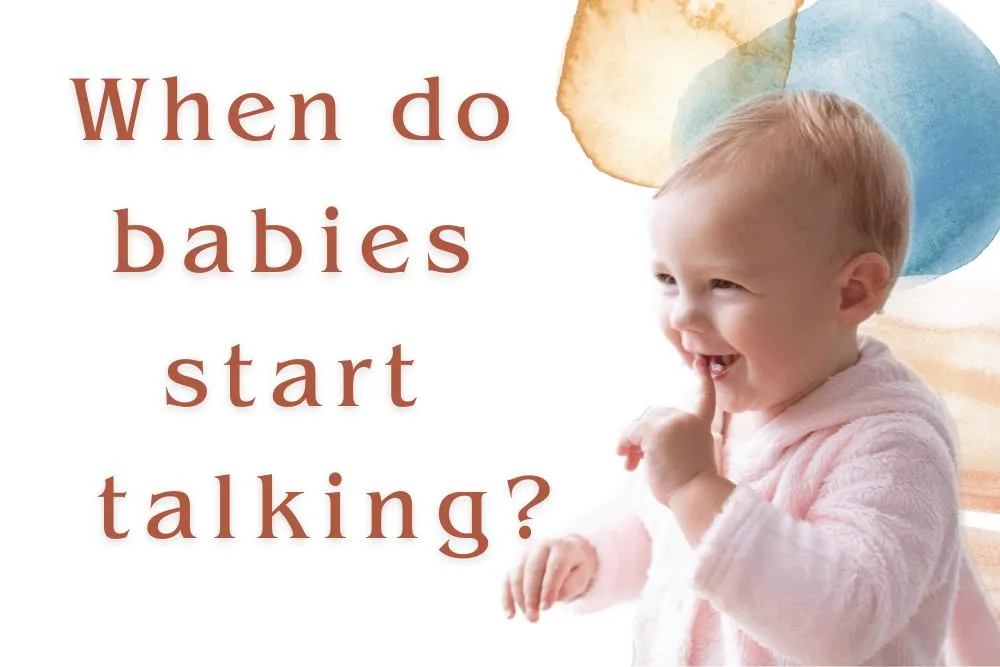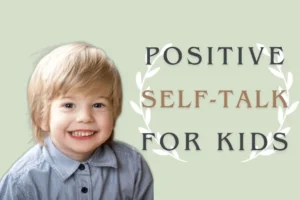Written by: Barbra Smith / Last updated: Mar 16, 2024
Each mom and dad who has a baby dreams of the moment when they hear for the first time their baby’s first words, which are mama and dada.
To reach that moment, parents spend several days and nights trying to figure out what their baby is trying to say.
A baby’s first words are usually formed at the age of 12 to 18 months, but they actually start to communicate with their parents after their birth by using some noise, which we call crying.
Crying is considered the only way that babies express their feelings, like being hungry or uncomfortable with their full diaper, etc.
In this blog post, we are going to discuss the following:
At what age do babies start talking?
A baby can learn about talking as soon as their sense of hearing is developed in their mom’s womb. In the 6th or 7th month of pregnancy, a baby can identify sounds around her, especially from her mom.
At this stage of pregnancy, moms should have fictional and simple conversations with the baby so that she can identify the sound of the mom and also know the sound of some simple words.
At the age of 3 months
Babies will start to respond to the sound around them and will move their heads in the direction of the sound, and sometimes you will start hearing coo or goo sounds from your baby.
At the age of 6 months
A baby will know her name and will have more control over her mouth and tongue, and she will make random sounds like babbling followed by cute mouth saliva.
At the age of 9 months
The baby will start to say simple and understandable words like da-da-da or ma-ma-ma.
Baby talk at the age of 12 months
At this age, babies start talking by having some simple words in their vocabulary, like mama, dada, and bye-bye, and they will also understand simple commands like “eat” and “drink.”.
Baby talk at the age of 18 months
The baby should know at least 30 words and can tell simple sentences of 2 words, like Daddy’s home or something like that.
Talk milestone at the age of 24 months
The toddler will know at least 100 words and will be able to make simple sentences from 3 or 4 words.
Talk milestone at the age of 36 months
By this age, the toddler’s learnability will be better than before, and she will have the ability to memorize new words every day.
She will also be able to make sentences of four or more words, and parents will be able to understand nearly all the talking from their toddler.
Related: BABY HYGIENE IN 7 SIMPLE TIPS
7 Tips to help with your baby’s first words and achieving speech milestones
New parents usually find that caring for a baby is a difficult task, but they do not know that it could be the easiest thing if they have the necessary knowledge.
Here are some tips to help you reach your baby’s first words:
Tip 1
Describe things around you with simple words so your baby can easily remember them.
Tip 2
Buy and read baby books to your baby, and while reading, try to point to the illustrations in the book and say their names with a clear voice to help with your baby’s first words.
Tip 3
You should create conversations with your baby so that she can catch new words every day, but consider talking to your baby in a way she can understand, like saying the word by using divided syllables, because saying the word in a normal voice will not help the baby remember the word.
Tip 4
A parent can also use the surrounding environment to help the baby learn new words like pointing to a toy and saying “toy,” and the same technique can be applied to anything.
Tip 5
Sing baby songs, as babies or any human can easily remember songs with beautiful melodies, and as a result, they can connect words to certain melodies.
Tip 6
Babies start talking when they are listened to, so paying attention to the babbles of the babies and reacting according to them can help with their speech milestones.
Tip 7
Ask parents around you about their personal experience with the speech milestones of their babies, because they should have some valuable tips regarding this topic.
What to consider while teaching your baby’s first words
New parents may miss out on some considerations while teaching their baby to talk, like:
Babies grow up at their own pace.
Babies are all different from each other, and they do not achieve every milestone likewise. That is why doctors prefer to use the term “phase” or “interval.” For example, some babies start teething while others start crawling, so there is no fixed rule.
A baby girl can have more achievements.
Parents should also consider that a baby girl may grow up faster than a baby boy due to biological variations so that girls can achieve speech milestones faster than boys.
Look for unnatural behavior.
Parents should notice the behavior of their baby at the age of 3 or 4 months when she hears surrounding sounds because when a baby does not correspond to sounds near her, there could be something wrong with her hearing, and she should be examined by a doctor.
Record every achievement.
This tip is not directly related to our topic, but it will have a positive impact on the relationship between you and your kid. Record on camera your baby’s milestones, like the first time to talk, crawl, eat, and walk.
Things to avoid while teaching your baby to talk
As many parents are busy with their careers, some of them try to free up some time by using technology methods or by hiring someone to help babies start talking and taking care of their babies.
Some of the most common mistakes parents make while trying to free up some time are:
- Hiring a babysitter who does not speak the mother tongue of the parents fluently could harm the phonetics of the baby, and that effect will last for a long time to be adjusted.
- Many parents think that leaving babies to watch kids’ channels on TV will substitute their efforts to teach the baby how to talk; on the contrary, TVs have negative effects on language development, sleep, and attention.
- Talking to the baby without using good grammar in the sentence will have a negative effect when the child learns about the grammar of her mother tongue.
- If you are a calm and silent person by nature, try not to be silent around your baby because a baby will not learn to speak when she has a silent parent.
How do I know that my kid has a speech delay
There are common signs for this issue, such as:
The child does not engage with others.
When your child prefers to stay alone and refuses to interact or socialize with other kids, that could be a sign of a speech delay.
The toddler prefers to use sound instead of talking.
Babies use their sounds to communicate with others, like babbling or grunting, which is considered normal in their first year.
If the baby still uses sound after their first year instead of trying to talk, then that is not normal.
The kid does not understand simple orders.
Normally, parents try to point toward an object and tell their kids to get it, like “get the ball.”
When parents do not point to the object while telling the kid to get it and the kid doesn’t respond, then this might be a sign.
In conclusion
So far, we have discussed and answered the question “When should babies start talking?” and some great tips to help new parents get the necessary knowledge to help them with that important milestone.
Which tip from this post are you going to try first to help with your baby talk?
Anyway, let me know by sending us your opinion.





